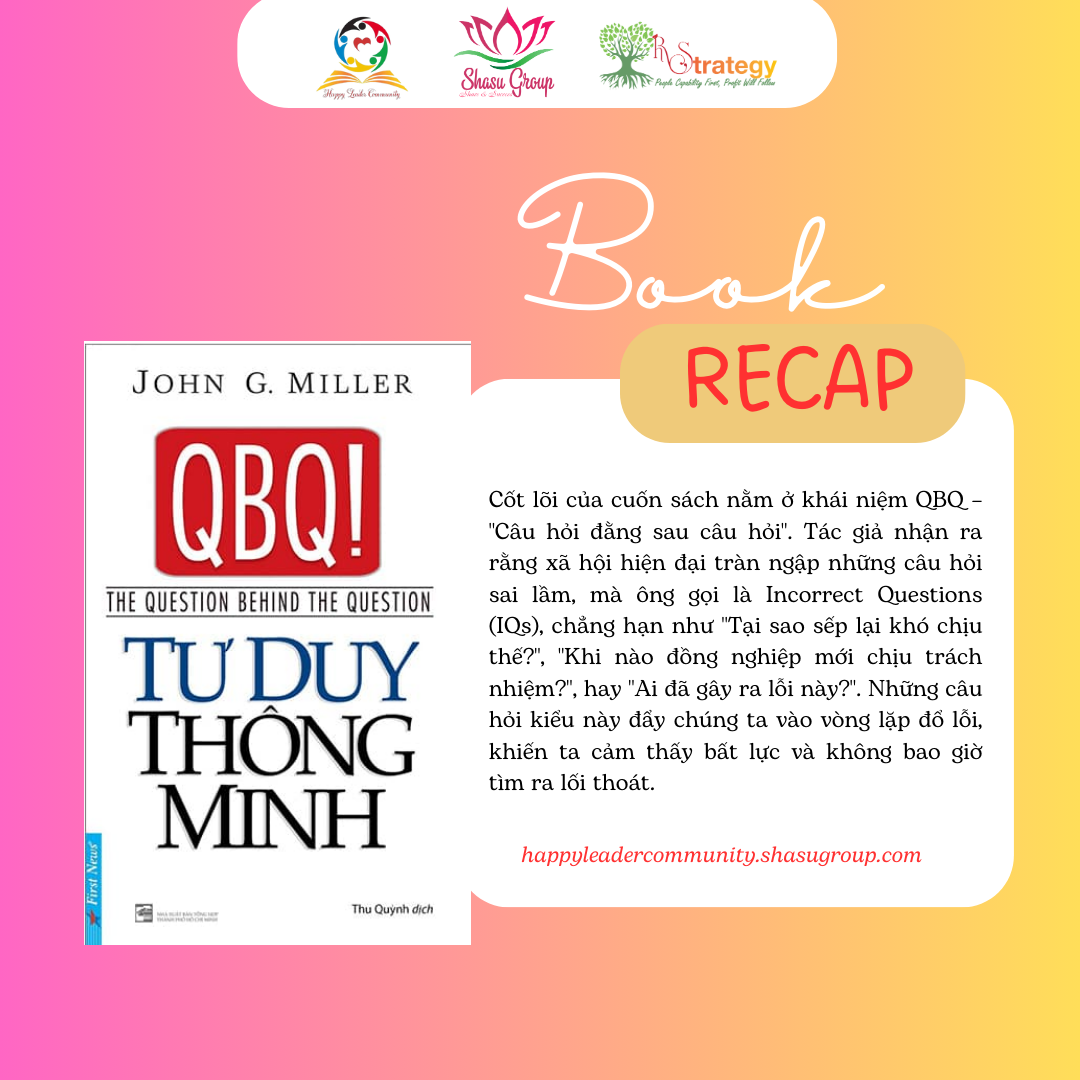With our busy schedules, it can be difficult to find time to reflect on who we are, our strengths and weaknesses, our drives and personalities, our habits and values. Also, many of us just aren’t willing to spend a lot of time on self-reflection. As a result, many of us have a fairly low level of self-esteem. first step to maximize managerial skills. Self-awareness can enhance our judgment and help us identify opportunities for professional development and personal growth.
So what is self-awareness?
1. What is self-awareness?
Simply put, self-awareness is knowing who you really are as a person.
But wait, obviously you know who you are, nobody knows you better than you! Truth?
The reality is that we often do not clearly see and understand the motivations behind our actions or the true causes behind certain emotions.
So we should read the book “Search Inside Yourself”: Search Inside You Before Looking For Other Things In The Outer World to better understand yourself.
2. Key Areas for Self-Awareness
Human beings are complex and diverse. To become more self-aware, we should develop an understanding of ourselves in many areas. Key areas for self-awareness include our personality traits, personal values, habits, emotions, and the psychological needs that drive our behaviors.
- Personality: an understanding of our personalities can help us find situations in which we will thrive, and help us avoid situations in which we will experience too much stress. For instance, if you are a highly introverted person, you are likely to experience more stress in a sales position than a highly extroverted person would.
- Values: it’s important that we each know and focus on our personal values. During the workday, so many problems and opportunities arise that our lists of “things to do” can easily exceed the time we have to do them. When we focus on our values, we are more likely to accomplish what we consider most important.
- Habits: our habits are the behaviors that we repeat routinely and often automatically. Although we would like to possess the habits that help us interact effectively with and manage others, we can probably all identify at least one of our habits that decreases our effectiveness. For example, if you are a manager who never consults your staff before making decisions, that habit may interfere with your ability to build your staff members’ commitment to the decisions and their decision-making skills as well.
- Needs: one of the advantages of knowing which needs exert the strongest influence on our own behaviors is the ability to understand how they affect our interpersonal relationships. Needs cause motivation; and when needs aren’t satisfied, they can cause frustration, conflict and stress.
- Emotions: emotional self-awareness has become a hot topic of discussion recently because it’s one of the five facets of emotional intelligence. Understanding your own feelings, what causes them, and how they impact your thoughts and actions is emotional self-awareness.
Tham gia cộng đồng học tập suốt đời cùng chúng tôi tại Happy Leader Community
3. How Self-Awareness Makes You More Effective

Self-awareness helps managers identify gaps in their management skills, which promotes skill development.
- Skill development: having an accurate sense of who you are helps you decide what you should do to improve. Often, self-awareness will reveal a skills gap that you want to work on.
- Knowing your strengths and weaknesses: self-awareness helps you exploit your strengths and cope with your weaknesses. For instance, if you are someone who is good at “seeing the big picture” that surrounds decisions, but not as good at focusing on the details, you might want to consult colleagues and subordinates that are more detail-oriented when making major decisions.
- Developing intuitive decision-making skills: In complex situations, intuitive decision makers process large amounts of sometimes unstructured and ambiguous data, and they choose a course of action based on a “gut feeling” or a “sense” of what’s best. Managers who are highly emotionally self-aware are better able to read their “gut feelings” and use them to guide decisions.
- Stress: jobs that don’t suit your personality tend to give you more stress than jobs that are more compatible. This is not to say that you should never take a job that conflicts with your personality. However, be aware that you will need to work extra hard to develop the skills for that job, and there are jobs that would be less stressful for you.
- Motivation: it’s very difficult to cope with poor results when you don’t understand what causes them. When you don’t know what behaviors to change to improve your performance, you just feel helpless. Awareness of your psychological needs can increase your motivation by helping you understand and seek out the rewards that you really desire such as a sense of accomplishment, additional responsibility, an opportunity to help others, or a flexible work schedule.
- Leadership: when we understand “what make us tick”–what gets us excited, why we behave the way we do, etc.–we also have insight into what makes others tick. To the extent that other people are like you (and, of course, there are limits to the similarity), knowing how to motivate yourself is tantamount to knowing how to motivate others.
The full title of this book is: Search Inside Yourself – MAKE PROFITS, CROSS OCCASIONS, AND CHANGE THE WORLD.
This is a book on MEDITATION. It’s an innovative combination of ancient meditation methods and modern emotional intelligence, so it’s not too difficult for each of us to start with meditation on our own. If you’ve always felt stuck in life, and sometimes acting out of control, this is the book for you.
You do not hear wrong, “Search Inside Yourself” is a book that helps you “see” through yourself. According to Chade – Meng Tan, an engineer who has worked on many important Google projects, and is also the author of this book: when you find and master yourself, then you can change the whole world.
Right now, let’s explore this book together!
Xem thêm về các nhóm của chúng tôi tại đây
4. The Content Of The Book:

4.1. Chapter 1: Even an engineer can succeed in emotional intelligence
The question here is how does emotional intelligence help our lives? To answer this question, Meng said that in the workplace context, intelligence helps equip three important skills:
- Outstanding working performance
- Excellent leadership ability
- The ability to create the conditions for happiness
To sum up the skills that emotional intelligence gives us is self-optimization. That’s when you function at a higher level than you’re inherently capable of. Even if you already excel at your job, honing your emotional faculties can still stretch your limits.
4.2. Chapter 2: Breathe as if your life depended on it
Meditation is no mystery. It’s really just mental training. Meditation is a form of training for the mind. If you lift weights, you will become stronger. If you jog regularly, you will run faster and farther. In the same way, when meditating your mind becomes calmer, more sensitive, you can focus your attention more intensely and for a longer time.
You can meditate in any posture you want. Make sure it’s a pose that helps you stay relaxed and alert at the same time for a long time.
4.3. Chapter 3: Meditation does not sit on a cushion
Meditation in action
People always consider walking on water or walking on air to be a miracle. But I think the real miracle is not walking on water or walking on air, but walking on land. Every day, we participate in a miracle we don’t even realize: blue sky, white clouds, green leaves, a child’s curious black eyes – our own. Everything is a miracle – The Miracle of Mindfulness
Other People Meditation (Listening Meditation)
Give your full attention every moment to others with a non-judgmental mind, love them as you love ourselves because you know “Listening is magic: it turns a person from an external, opaque or potentially dangerous object into an intimate experience, and thus a friend. In this way, listening softens and transforms the listener.” Norman Fischer.
Talking Meditation
We can extend listening meditation to talking meditation. This skill has three parts: listening, knotting, and dipping. Listening means giving the gift of attention to the speaker. To tie a knot means to close the circle of communication by showing that you have really listened to what the other person has to say. Don’t try to remember everything: if you really listen, you will. Embedding means examining yourself, knowing how you are feeling about what you are hearing. Give your full attention to the speaker, while remaining fully aware of your feelings.
4.4. Chapter 4: Organic confidence
To gain confidence you need to have self-awareness, which “Self-awareness is a neutral mode that helps maintain self-criticism even in the most tumultuous of emotions”, Daniel Goleman.
Increase your self-awareness in one of two ways: Body Scan or Take Notes. These two approaches, by supporting self-knowledge and being honest with yourself, also create the conditions for self-confidence.
4.5. Chapter 5: Controlling emotions is like taming a horse
To leverage self-awareness to gain control over our own emotions we must learn to self-regulate. According to Daniel Goleman, there are five emotional competencies that fall under the realm of self-regulation:
- Self-control: Controlling emotions and conflicts that can cause chaos
- Credibility: Maintain standards of honesty and integrity
- Dedication: Take responsibility for your own actions
- Adaptability: Flexibility to respond to change
- Innovation: Get comfortable with new ideas, approaches and information
Remember that self-regulation does not mean avoiding or suppressing emotions, nor does it mean achieving certain emotions. Self-regulation is simply mastering the handling of emotions in a positive, beneficial way for everyone.
4.6. Chapter 6: Making Profits, Crossing Oceans, and Changing the World
The secret of success is “distributing happiness”. According to Tom Hsieh, there are three types of happiness: pleasure, passion, and noble purpose. In which, happiness derived from a noble purpose has the highest sustainability, especially when that noble purpose comes from selflessness. And the best way to find motivation at work is to find your lofty purpose.
4.7. Chapter 7: Empathy and the tango of the brain
Empathy is not agreeing or psychoanalyzing. It is understanding others, both on a rational and instinctive level, lovingly, and respectfully opposing them.
To become more empathetic we need to create an instinctive mind that responds lovingly to everyone and an automatic awareness of seeing others as just ourselves. When you and others have similarities, the ability to empathize will be higher than normal, and the trust of others in you will also be built. Let’s start with love, sincerity and openness.
4.8. Chapter 8: Being Effective and Beloved at the same time
There are three basic social skills for being both effective and loved: leading with compassion, influencing with kindness, and communicating with understanding.
4.9. Chapter 9: Three easy steps to world peace
Start with yourself and make meditation a science, bringing meditation to life.
5. Review of the book:
The book is written in a scientific way and has some humorous parts, just like the author’s personality. Then, the author will give scientific arguments and evidence to prove the benefits of meditation. Finally, the author will lead us into a simple meditation practice that only takes about 1-7 minutes. Meditation has never been so simple and gentle, right? That is also the author’s motto in this book: Bringing meditation into reality.
Xem thêm về các nhóm của chúng tôi tại đây
The meditation exercises will go from easy to more difficult. But in general, nothing is too difficult to follow. You can follow anywhere and anytime. Meditate while listening, speaking, sending mail, etc. There will be many meditation exercises introduced in the lesson. But what we need to pay attention to most when practicing is attention and comfort.
6. How do I read this book?
This is a book that is both read and practiced, so we should read it slowly, pay attention to each word, and follow the meditation exercises in it. Every day you don’t need to read much, just read a few items and then contemplate, practice about it, that’s enough. And with the stories and references given at the beginning of the book, I had to cool down that eagerness to find a better approach to the book. And after some experimentation, I read this book with the following procedure:
Sit quietly and breathe for 1-2 minutes to relax and calm down.
Start reading books.
Use a highlighter to highlight important or impressive parts of the book.
Read about 1-2 large items, then pause. If it’s a scientific proof, you can re-read the parts you don’t understand and think about it.
If it’s the practice part, read it again and practice it at the same time.
After finishing, sit back to breathe and meditate for 1-2 minutes and then finish reading for that day.
With this process, every day I read about 3-4 items. It takes about 30 minutes to 1 hour. There is no need to set a goal to read quickly to get to the next book. With this book, I need to meditate and practice every day for meditation to become a habit and gradually come into my life naturally.
So after rummaging through you for a while, what did you find? What we find may be different, but the same thing is that we all slowed down. This particular meditation book is one that makes you slow down in the midst of all the worries out there. When we live in a fast-paced age, aren’t slow-paced people very noticeable? Slow down, get out of the vortex created by humanity, we will find the happiness that has always been there with us for so long.
Source:
https://www.goodreads.com/review/show/2431618386
Sách Search Inside Yourself – Chade – Meng Tan
Collection & Edit by Marketing Dept from Team Happy Leader Community – Shasu Group
Signup now LEADERS DEVELOPMENT TRAINING COURSE 2022
Follow us:
- Facebook: https://www.facebook.com/HappyLeaderCommunity
- Website: https://happyleadercommunity.shasugroup.com
Our Services
- Business Consultant: https://consultant.shasugroup.com/
- Executive, Business, Performance, Leadership Coaching & Mentoring: https://www.shasugroup.com/coaching-mentoring-consulting
- Training Solution: https://training.shasugroup.com/
- Fundraising & M&A Consultant: http://invest.shasugroup.com/
- International Sales Connection Service: http://export.shasugroup.com/
- Headhunter(Recruitment Service): https://hrstrategyvn.shasugroup.com/












